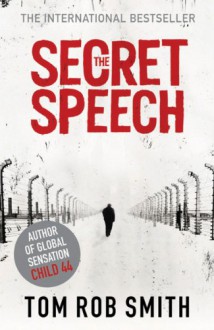Tom Rob Smith’s first book, Child 44, enjoyed unprecedented attention and acclaim (as did its youthful author), so it was inevitable that the appetite for that novel’s successor would be keen. Now it’s here, and The Secret Speech, largely speaking, lives up the promise of its...
show more
Tom Rob Smith’s first book, Child 44, enjoyed unprecedented attention and acclaim (as did its youthful author), so it was inevitable that the appetite for that novel’s successor would be keen. Now it’s here, and The Secret Speech, largely speaking, lives up the promise of its Fleming-Dagger-winning predecessor, despite being a very different book: Ex-MGB officer Leo Dormidov returns and becomes involved in a narrative so incident-packed it makes the earlier book seem positively sedate. The most memorable thing about the first novel, of course, was the moral transformation of the hero, initially a charismatic tool of the brutal state apparatus, enforcing the Stalin-era edicts with grim efficiency until he becomes hunted rather hunter and earns some hard-won humanity. Part of the point of Child 44 was the protagonist’s journey of character – so how to follow this, when Leo has become a human being by the end of the first novel? The Secret Speech performs this tricky balancing act by taking the reader back to 1949, with Leo the unreformed agent of the state, behaving with the callousness he once possessed before his life was turned upside down. We are then taken to the mid-fifties, after the death of Stalin (as cracks begin to show in the totalitarian Soviet State). Khrushchev’s famous denunciation of the Stalin era ushers in significant changes, and Leo Dormidov (along with his wife Raisa and their daughters) are in danger, as the power of the police is undercut – and, in fact, the police are now identified as enemies of the state. This is only one of the dangers that Leo faces: there is now a ruthless enemy on his trail – as ruthless as Leo was himself in the days of his authority and acclaim.There is no denying that the bracing innovation of the first book (in what is to be a trilogy) burns at a lower wattage here – that’s inevitable – but Smith is too adroit a writer not to keep us comprehensively gripped (breathless, even, as climax after climax is piled into a crowded narrative). --Barry Forshaw
show less

